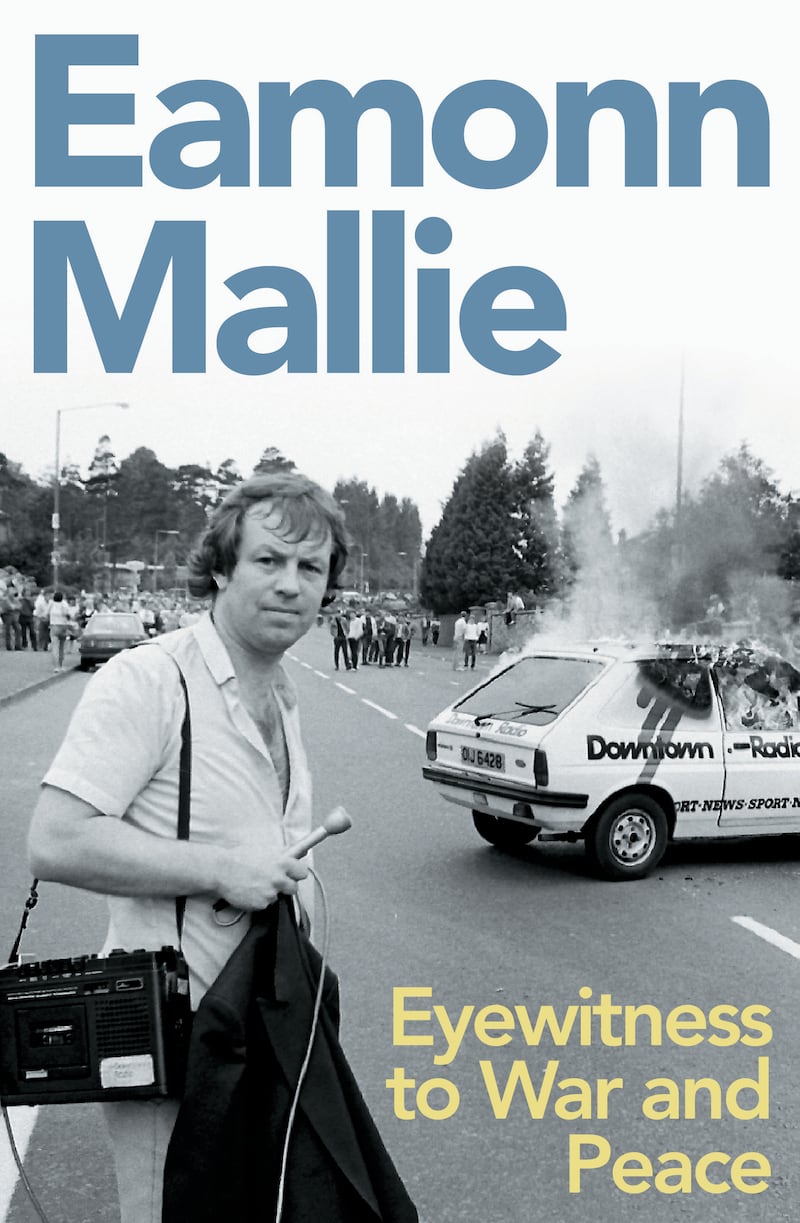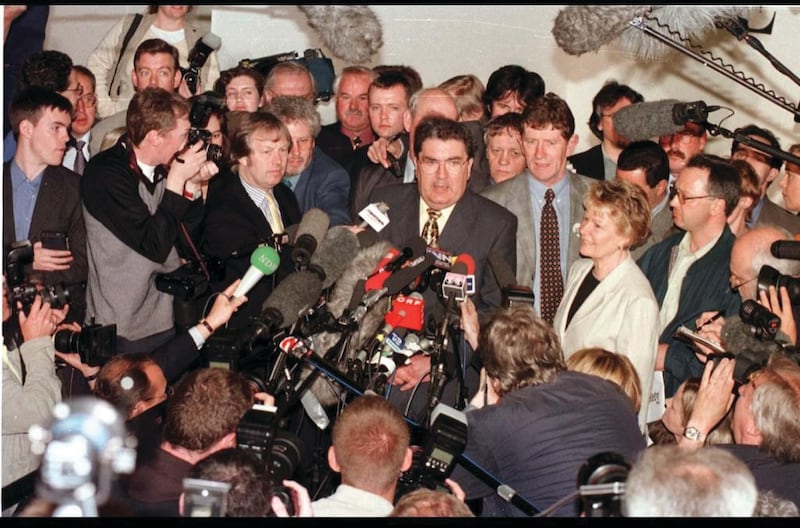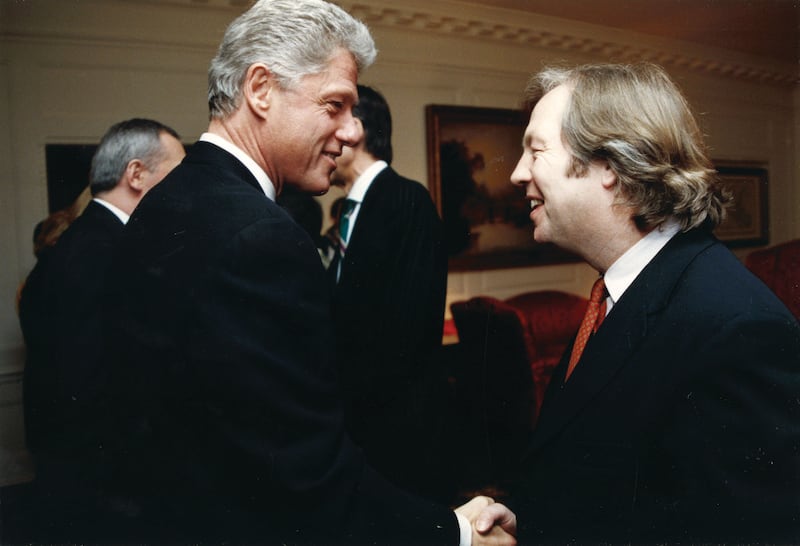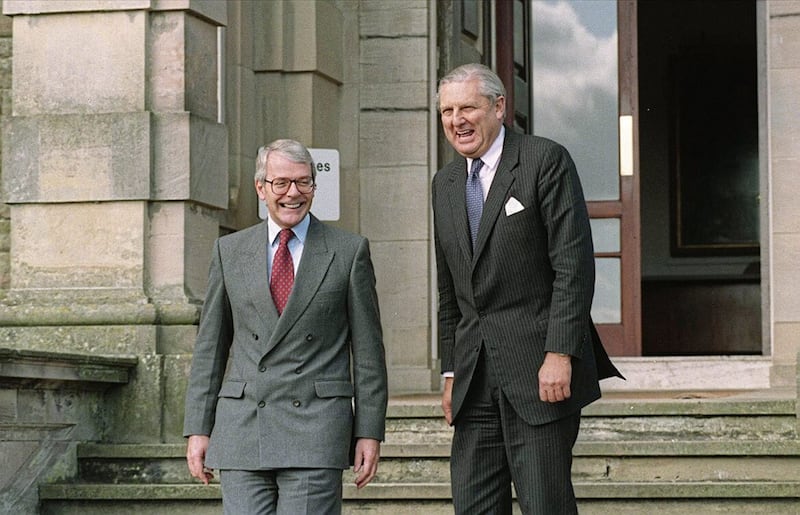EAMONN Mallie has cut a distinctive figure across Irish journalism for close to 50 years now, throughout a career that has seen the south Armagh-born reporter covering some of the most seismic events of our troubled history.
From his earliest days breaking stories with Belfast’s Downtown Radio in the late 1970s, to his latter years as a freelance operator in print and on the airwaves, Mallie (73) spent over 20 years at what he describes as “the coalface” in the north, covering hunger strikes, shootings, bombings, marches, protests, royal and presidential visits, and the protracted negotiations which resulted in the signing of 1998′s momentous Belfast Agreement – a feat the reporter describes as “miraculous”.

While his memoir is aptly titled Eyewitness to War and Peace, these days life is much less hectic for Mallie, who has become a familiar face on our television screens with his one-to-one interview-based show, Eamonn Mallie: Face to Face with....
The UTV series is produced by his son, Michael, who was also part of the team behind last year’s award-winning Sinéad O’Connor documentary, Nothing Compares.
The veteran newsman has condensed decades of reportage into a fascinating, hugely readable and frequently revelatory 258 pages, which also serve as a neat overview of the north’s transition from conflict to compromise.
But does he miss being at that “coalface”, on the constant hunt for his next career-making scoop?
“No,” responds Mallie, firmly and without hesitation.
“I lived very dangerously as a journalist, I went places where others would have chosen not to go. Like, who else would have gone in to see Bobby Sands [in Long Kesh] in 1979, you know?
“But journalism is such a selfish career. The amount of time I spent outside the home, like when I went off to Gibraltar [to cover the SAS assassination of an IRA hit team in March 1988 and the subsequent inquest in September] for weeks at a time.
“My wife, Detta, was left with our three young children and no back-up. Her family were from Galway and mine were all in south Armagh, so she had to carry the can: she stopped working so she could look after those children.
“Looking back, I’m very willing to admit I was very selfish. It was a form of addiction, really. But do you know something? Today’s generation wouldn’t put up with it – my two daughters [Ciara and Laura-Kate] certainly wouldn’t.”

The book also finds the south Belfast-based writer recounting his childhood in the shockingly impoverished rural borderlands of the 1950s, part of a six-child household which lacked electricity and running water, but was equipped with an expensive Oxford Dictionary and Encyclopaedia: Mallie’s mother, Eileen, held reading and education in the highest regard.
“The only running water was running down the walls,” recalls the south Armagh man, who named his recent poetry collection, Under The Tilley Lamp, after the primitive paraffin-fuelled lighting his family once relied upon.
“[This book] is quite a big contribution to the social history of that time in rural Northern Ireland.”
The 13-year-old Mallie was watching television at a more affluent neighbour’s house when the news of John F Kennedy’s assassination broke via a bulletin delivered by RTÉ's Charles Mitchell: this historic 1963 report planted a seed which would germinate in the following decade.
Despite failing to secure a spot with RTÉ as a newsreader after graduating from Trinity College Dublin, where he studied Irish and Spanish - and, more importantly, met his wife of 48 years - Mallie eventually headed north to become a trainee producer with BBC Radio Ulster..
This provided an early, distressingly close-to-home taste of the fast-escalating Troubles when he was dispatched to cover the bombing of Donnelly’s Bar in Silverbridge, in December 1975: Mallie’s sister, Goretti, had worked there and his mother and father were close with the owners, who lost their 14-year-old son in the loyalist attack.

His subsequent work would soon bring him into contact with some of the most well-known names of the era. Eyewitness includes Mallie’s myriad encounters with the likes of Ian Paisley, Martin McGuinness, Gerry Adams, Margaret Thatcher, Bobby Sands, John Hume, Bill Clinton, Tony Blair and former secretary of state, Patrick Mayhew.
The reporter enjoyed a curiously cordial relationship with Ian Paisley: indeed, an entire chapter is deservedly devoted to the former First Minister, particularly the incredibly revealing extended television interview he conducted with the freshly ousted DUP leader in 2014.
“We had so many laughs, and he was a brilliant source - he leaked so many documents to me,” Mallie reveals of their interactions over the years.
“I was in Ballymena with him one night and he had the crowd revved up to the skies. I was the only Catholic in the place and I was thinking to myself, ‘I could get lynched here’.
“Just then, he turns to look at me and says to the crowd: ‘Eamonn’s a Roman Catholic - but he’s alright, I like him.’”

Patrick Mayhew, meanwhile, was at the centre of one of Mallie’s biggest ever scoops in 1993, when he broke the story that the British government had long been engaged in secret ‘back channel’ talks with the IRA.
“I remember calling John Haslam, a very senior man in the press office,” recalls Mallie of how he doggedly pursued his lead.
“I said to John, listen, I am not going away, I am following this story to the end: is the British government in communication with the IRA? To which he replied, ‘No – this auld twaddle has been doing the rounds for a few months now’, a reference to me repeatedly asking the same questions.
“I said to him, well, John, I just hope this doesn’t end up being another Watergate for you guys.”
My Memoir ‘Éamonn Mallie Eyewitness to War and Peace’, published by (@MerrionPress ) is yours from Thursday. In the next few minutes I am giving you a flavour of what you can expect to read. @MiriamOCal @eamonnholmes @tombradby @little_pengelly pic.twitter.com/cfKannwSBd
— Eamonn Mallie (@EamonnMallie) February 12, 2024
Eventually, a document supplied by the Reverend Willie McCrea allowed Mallie to verify and publish the story in The Observer under the headline ‘Major’s secret links with IRA leadership revealed’.
“That ‘old twaddle’ resulted in Mayhew offering his resignation, and also John Chilcot, the Permanent Under-Secretary of State at the Northern Ireland Office, which I’m revealing for the first time in this book,” explains the author.
Eyewitness to War and Peace will be launched with a free event in the Lanyon Building at Queen’s University Belfast on Thursday February 29, with Mallie ‘in conversation’ with Eamonn Holmes.
As you’ve just read, they certainly have plenty to talk about.






